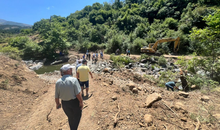
 Flash News
Flash News
Ceno Klosi with over 800 stolen votes, Balluku finds the reason is the tiredness of the counters
"Fast & Furious" in the former Block, police chase an Audi Q8, 4 cars collide
Car hits two tourists on a motorcycle in Fushe Arrëz, one of them dies
Serious accident in Thumanë, one dead, 3 injured
Durrës Court suspends the director of Pre-University Education from duty
VOA: Pensions facing the challenges of population aging and informality in the economy

In Albania, the stability of the pension system is one of the main challenges of the government. In the last 30 years, it has been hit by a number of factors related to informality in the economy, the aging of the population or high immigration. The pension scheme continues to be endangered by continuous and long-term pressures, and the official authorities are recently cooperating with the World Bank, to face this reality. Voice of America correspondent in Tirana, Mimoza Picari, spoke with officials, experts, retired citizens and representatives of the World Bank.
The changes that the pension scheme underwent a decade ago, such as the increase in the retirement age, or the establishment of equality, i.e. a fair ratio between contributions and the amount of the pension, accompanied by other measures brought financial stability. Today the deficit of the scheme is 0.85% of GDP from 2 which was ten years ago. This means that the state budget funds that are used to supplement those of pensions have decreased. But still, officials think that the scheme is receiving constant blows mainly from demographic developments, such as immigration, the drop in births or the increase in life expectancy, which consequently bring about the aging of the population. The World Bank predicts that in 2035 the population of retirement age will increase to 24% from 19 in 2019. Today, 705,000 citizens enjoy a pension and the contributory beneficiary ratio is 1.17 to 1, a fragile ratio for a sustainable pension scheme. On the other hand, retired citizens claim for the Voice of America that the amount of pensions is not enough to afford living.
They say that the costs are high and that they face many difficulties.
Therefore, one of the main challenges for the authorities remains the pension measure, in order to afford living. The government has indexed the pensions in
continuity, but again they remain low, in relation to the costs. Director of ISSH (Institute of Social Security) Astrit Hado argued for the Voice of America that the reasons for low pensions extend over the years, such as informality in the economy, undeclared work and under-declaration of wages. According to Instat, there are about 1,300,000 employees in Albania and 40% of them do not contribute to the scheme.
"Pensions are low, due to low contribution years, low wages on which contributions were paid, early retirement and increased retirement age. Those who are 75-80 years old today retired at 50-45 years old, that is, they have 25 to 30 years, but they have paid contributions for 25 years and have been receiving pension for 30 years. Pensions are not money-making factories. Citizens should understand that pensions are not according to need, but according to merit. Pensions do not provide as much pension as the individual needs, but as much as you have contributed. What we need to see is the measure of the pension, which means that the pension that will be benefited from the scheme is inherent and sufficient for a dignified life" - says Mr. Hado.
The manager of the World Bank office in Albania, Mr. Emanuel Salinas, in an interview for the Voice of America, said that - "the number of people in the labor market does not contribute enough to the pension scheme". Some causes, as he says, are related to contributions based on the minimum wage. "Even the self-employed contribute less than the level of income would require, while there are also many people who are in informal employment, and maybe they are not contributing at all" - argues Mr. Salinas.
"The objective we are trying to achieve with the pension system policy review, working together with the government, is a pension system that provides sufficient resources for people when they reach retirement age, that is sustainable and affordable by the government that to make those payments, but at the same time to be a fair system. It means that people get pension
according to the degree they have contributed and also to have justice between generations. We want to convey to young people the confidence that if they contribute now, when they reach retirement age they will have a reasonable level of income through retirement" - says Mr. Emanuel Salinas.
Even citizens of retirement age say for the Voice of America, that it is necessary for people to be aware of paying pension contributions.
The private sector in Albania is the largest contributor to the pension fund. The construction industry and services carry the highest weight. Agriculture, although it employs almost half of the labor force in the country, has a low rate of contributions, due to its irregular operation.
The authorities explain that the government's policy to increase wages has brought more contributions to the social security fund, but researchers of economic developments in the country also emphasize the need for an economy with a high level of productivity and high wages. Economy expert Selami Xhepa suggests alternative schemes.
"The alternative scheme, in addition to strengthening private pension funds, would be pension accounts with tax privileges and protected and guaranteed by the state. So we can allow every citizen from the annual income to remove 2 thousand euros per year in this deposit which will be non-taxable, the tax liability will be deducted during the year. And after 40 years of work, each individual could have 80 thousand dollars to afford a more comfortable life with his savings" - argues Selami Xhepa, President of UET.
The pension scheme is suffering the consequences of more than three decades of unstable economic and social developments.
Over the past few years, a troubling problem has been surfacing. A full pension is obtained after 38 years of work, and the minimum one after 15 years, while it is noted that the number of young pensioners has increased, with more
few years of work. The average years of work for nearly 40,000 people who retire each year has been falling, from 30 two years ago to 27 and a half years currently. But the authorities state with concern that the number of pensioners who have 15 years of work has also increased. This means a low pension for them and more difficulties to cope with life.
"There are other reasons why these things happen. In the 90s, when the communist system fell, until the Albanian economy began to be formalized in the 2000s, there was high unemployment, high informality and mass emigration. Today, those born in 1962 are retiring, having only 15 years during the communist regime. Let's not forget the immigrants who fled to Greece and Italy, worked there, did not contribute here, and when they retire, they only have 15 years of work. People should understand that retirement is not thought about the day you reach retirement age" - argues Astrit Hado, director of ISSH.
ISSH admits that the percentage of the pension in relation to the average salary is falling. The general average is 32%, while in developed countries the pension reaches 60% of the net salary. The WB notes that incentives must be created to increase people's awareness of paying social contributions, while underlining that it is working with the government to address recommendations in this direction./VOA
Latest news





Lufta në Gaza/ Pse Netanyahu do vetëm një armëpushim 60-ditor, jo të përhershëm?
2025-07-02 21:56:08
US suspends some military aid to Ukraine
2025-07-02 21:40:55



Methadone shortage, users return to heroin: We steal to buy it
2025-07-02 20:57:35
Government enters oil market, Rama: New price for consumers
2025-07-02 20:43:30
WHO calls for 50% price hike for tobacco, alcohol and sugary drinks
2025-07-02 20:41:53







Israel agrees to 60-day ceasefire in Gaza, but many unanswered questions remain
2025-07-02 18:35:27
The weather in Germany is going "crazy", temperatures reach 40°C
2025-07-02 18:22:21

"Fast & Furious" in the former Block, police chase an Audi Q8, 4 cars collide
2025-07-02 17:59:25
"Birth on a tourist visa? US Embassy warns Albanians: This is prohibited!"
2025-07-02 17:48:16


BIRN: Fier recount reveals vote trafficking within open political party lists
2025-07-02 16:57:19

CEO and former director of 'Bankers Petroleum' arrested in Fier
2025-07-02 16:40:42
Car hits two tourists on a motorcycle in Fushe Arrëz, one of them dies
2025-07-02 16:33:23



Fire at the Elbasan Incinerator Landfill, Prosecution Launches Investigations
2025-07-02 15:34:54
What you need to know if you travel to a country with active volcanoes
2025-07-02 15:33:03



EU proposes 90% reduction in greenhouse gases by 2040
2025-07-02 14:50:23
Europe is burning from the heat / Italy and France are on maximum alert
2025-07-02 14:36:52

Moscow's contradictory statements: Is the friendship with Vučić breaking down?
2025-07-02 14:21:05
'I lost my battle': Sea warming is killing fishing in Albania
2025-07-02 14:08:35
Sekretet kimike që ndihmojnë në mbajtjen e mjaltit të freskët për kaq gjatë
2025-07-02 14:01:26

Denmark makes historic decision to make military service mandatory for women
2025-07-02 13:44:33
The appeal of the GJKKO leaves former judge Pajtime Fetahu in prison
2025-07-02 13:30:20
Productivity losses could reduce GDP by 1.3% as a result of extreme heat
2025-07-02 13:21:04
He abused his minor daughter, Zamir Meta is left in prison
2025-07-02 13:04:04

Waste burning in Elbasan, Alizoti: They are poisoning people and stealing money
2025-07-02 12:48:39
Civil disobedience continues in Serbia, dozens of people detained
2025-07-02 12:40:32
Rama's government was born under the sign of garbage and will end like this
2025-07-02 12:28:09
Water prices increase in the municipalities of the Elbasan region
2025-07-02 12:13:38
Civil disobedience continues in Serbia, what is happening in Belgrade?
2025-07-02 12:07:44
Serious accident in Thumanë, one dead, 3 injured
2025-07-02 11:54:42
Durrës Court suspends the director of Pre-University Education from duty
2025-07-02 11:49:27
Plenary session on Thursday, what is expected to be discussed
2025-07-02 11:36:43
Europe is burning from heat waves/ What is the 'thermal dome' phenomenon?
2025-07-02 11:26:25
Wanted by Italy for murder, 45-year-old arrested in Vlora
2025-07-02 11:19:31
Fire situation, 28 fires reported in 24 hours, 2 still active
2025-07-02 11:13:20
"Buka" file, preliminary hearing for Ahmetaj postponed to July 17
2025-07-02 11:03:30


Baçi: Belinda Balluku and Ceno Klosi, the most dangerous "gangs" in Fier
2025-07-02 10:32:09
Zamir Meta, suspected of sexually abusing his daughter, arrives in court
2025-07-02 10:21:33

Trump: Israel has agreed to a 60-day ceasefire in Gaza
2025-07-02 10:01:55
Fire continues at Elbasan landfill
2025-07-02 09:51:13

Dates to note during July, important events will occur
2025-07-02 09:31:45
The hearing for Jorgo Goro's claim is postponed
2025-07-02 09:24:19



Foreign exchange, the rate at which foreign currencies are sold and bought
2025-07-02 08:42:31

52% of pensioners did not receive full pension in 2024
2025-07-02 08:27:18
Horoscope, what do the stars have in store for you today?
2025-07-02 08:13:36
Hot weather, Wednesday brings high temperatures
2025-07-02 07:59:16
Morning Post/ In 2 lines: What mattered yesterday in Albania
2025-07-02 07:46:15
Heatwave sweeps across Europe, Spain and England record hottest June ever
2025-07-01 22:57:41






Golem and Qerret without water at the peak of the tourist season
2025-07-01 21:09:32

Euractiv: Italy-Albania migrant deal faces biggest legal challenge yet
2025-07-01 20:53:38
BIRN: Brataj and Fevziu victims of a 'deepfake' on Facebook
2025-07-01 20:44:00

Vlora by-pass, work delays and cost increases
2025-07-01 20:24:29



Milan are expected to give up on the transfer of Granit Xhaka
2025-07-01 19:41:25

